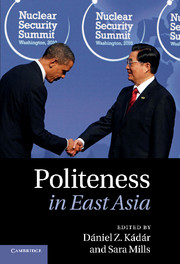Book contents
- Frontmatter
- Contents
- Notes on contributors
- Foreword
- Acknowledgements
- Abbreviations
- 1 Introduction
- Part I Politeness in East Asia: Theory
- 2 Politeness and culture
- 3 Honorifics: The cultural specificity of a universal mechanism in Japanese
- 4 Methodological issues in East Asian politeness research
- 5 Intercultural communication and East Asian politeness
- Part II Politeness in East Asia: Practice
- Notes
- Bibliography
- Index
4 - Methodological issues in East Asian politeness research
from Part I - Politeness in East Asia: Theory
Published online by Cambridge University Press: 07 September 2011
- Frontmatter
- Contents
- Notes on contributors
- Foreword
- Acknowledgements
- Abbreviations
- 1 Introduction
- Part I Politeness in East Asia: Theory
- 2 Politeness and culture
- 3 Honorifics: The cultural specificity of a universal mechanism in Japanese
- 4 Methodological issues in East Asian politeness research
- 5 Intercultural communication and East Asian politeness
- Part II Politeness in East Asia: Practice
- Notes
- Bibliography
- Index
Summary
Introduction
The goal of this chapter is to provide an overview of methodological issues in politeness research, particularly in the study of East Asian politeness. Linguistic politeness is an intriguing and challenging topic not only because of the almost infinite linguistic forms through which politeness can be expressed, but also because of its close ties to many sociocultural factors, including ideology, power, social distance and the perception of self in relation to others. It is one of the most dynamic linguistic phenomena in language use. For these reasons, politeness research has fascinated scholars in many fields, including pragmatics, sociolinguistics, and cross-cultural and intercultural communication.
Research in the West on the subject of politeness can be dated back to the late 1960s and early 1970s, and theoretical debates over modelling linguistic politeness have covered many aspects of this issue. Early works on politeness focused on the pragmatic aspects of politeness, treating politeness as part of pragmatic competence (e.g. Lakoff, 1973; and Grice, 1975). Leech's (1983) theory focused on general pragmatics, viewing politeness as principle-controlled, operating on a set of maxims. Brown and Levinson's influential politeness model (1978, 1987) introduced the notion of ‘face’ and social variables to the linguistic politeness model. In contrast with the previous – basically prescriptive – research, the current postmodern politeness theoretical line (e.g. Eelen, 2001; Mills, 2003; Watts, 2003) has brought fresh blood to the veins of politeness research from two perspectives. Postmodern scholars have critically reviewed the notion of politeness (see, e.g., the distinction between first-order and second-order politeness proposed by Watts, 2003), and they have also departed from the earlier politeness frameworks in that they have brought contextual factors into the analysis of politeness, that is, they argue for a discursive approach to include evaluation and interpretation of politeness within politeness theory.
- Type
- Chapter
- Information
- Politeness in East Asia , pp. 71 - 97Publisher: Cambridge University PressPrint publication year: 2011
- 4
- Cited by

